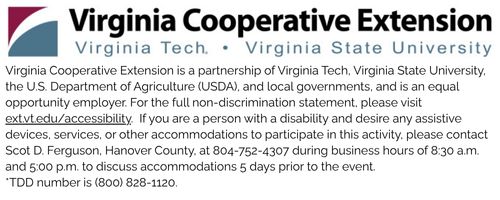Master Gardener speakers are available to garden clubs, businesses, libraries, civic groups, and other community organizations. We have a broad range of garden topics and speakers with in-depth knowledge to share.
speakers with in-depth knowledge to share.
Individual talks range from one-half hour to one hour plus question and answer sessions.
If interested, please contact our Help Desk at (804) 752-4306 or email us at [email protected]
Current Topics:
Beneficial Insects
Get acquainted with the deadliest predators in your garden. Learn how to recognize and attract these beautiful and helpful insects by creating a habitat that allows them to thrive and hunt. Can you guess who they are?
Ferns in the Home Garden
Do you have some shade in your garden? Learn about these shade powerhouses, including a bit of fern history and botany. Be introduced to different ferns and their various characteristics and uses.
Avoiding Pesticides in the Home Garden
The suffix “cide” means to kill. Pesticides encompass a range of products, including insecticides, fungicides, and herbicides, among others. This presentation describes the way in which active ingredients work and the risks/unintended consequences for non-targeted species. More environmentally safe methods of control are discussed.
Backyard Water Quality
Water quality starts in our own backyards. Everything we do on our properties affects our smaller watersheds, and ultimately, the Chesapeake Bay. Covered are various strategies to mitigate runoff and the resulting pollution. There is a lot we each can do, starting in our own backyards.
Trap Crop Gardening
Trap cropping is the newest development in the world of vegetable gardening. Learn how to lure the “bad” bugs away from your prized vegetable crops and minimize or eliminate the need for pesticides.
Native Groundcovers for Shady Areas
Groundcovers planted to cover deeply shaded areas around trees are often plants native to other parts of the world, such as Wintercreeper, English Ivy, or Ajuga. These plants often spread beyond our gardens into areas where they become invasive. This presentation covers native groundcovers and other native plants which can fill those shady spaces. Both dry-shade and wet-shade species are addressed.
Lawns and Native Sedges
Learn how to establish and maintain a cool-season fescue lawn, how to conserve water, and the proper use of lawn fertilizers and pesticides. Consider adding alternative native grasses, sedges, and /or shrubs as replacements for turf.
The Importance of Native Trees
Discuss the importance and benefits of native trees in Central Virginia. Learn the principles of tree selection, maintenance, and protection. Become acquainted with the Tree Steward/Advanced Master Gardener programs and their many community projects, such as pruning, planning tree inventories, and tree walks to identify native trees in the urban landscape.
Soil Testing
Learn the ins and outs of soil testing. Why you want to do it, how to do it, and what results to expect. Walk through the entire process with our speaker and receive a soil test kit to take home.
Native Ground Covers for Shady Areas
Groundcovers planted to cover bare areas around trees and other deeply shaded areas are often native to other parts of the world, such as Ajuga, Wintercreeper, or English Ivy. These plants often migrate out of our gardens and into areas where they become invasive. This program covers native ground covers and other native plants that can fill those bare spots. Both dry-shade and wet-shade species are covered.
Tips for Growing Hydrangeas
Meet our resident Hydrangea expert and learn how to keep these quintessential southern shrubs thriving and blooming. Covered are the different types of hydrangeas and their best environments; how and when to prune; and disease prevention and treatment.
Common Invasive Garden Plants and Some Alternatives
Many common garden plants such as English Ivy and Privet have migrated from our yards into natural areas, displacing native plants. Discussed is the harm invasive plants cause in parks and natural areas; how to remove/prevent their spread; and good native alternatives.
A Fresh Look at Strawberries
Who doesn’t love strawberries ripe from the garden? Explore the different types of strawberries, including all-summer varieties; tips for getting the best crop; and even how to grow them from seed.
Transform Your Yard into a Bird and Wildlife Habitat
What can you do to attract more birds, butterflies, pollinators, toads, and other wildlife to your yard? Beginning with native plants, learn how to convert a traditional landscape into a more wildlife-friendly habitat.
Dividing Perennials
Has that iris or daylily clump gotten too crowded with lots of plants and not much bloom? Is that stunning aster threatening to take over most of the flower bed? Want to share that lantana with a friend? Our speaker will guide you through the process of dividing, replanting, or sharing your favorite perennials.
Daylilies
Come along with our resident daylily expert and learn how to choose, plant, and care for this enduring garden favorite. Explore the various types of daylilies and how they complement other plants in your garden.
Invasive Plant Species and Retail Sales
Get the latest information on invasive plant species legislation recently passed by the Virginia General Assembly. Included in this talk are the plants designated as invasive and the requirements for retailers. Alternative non-invasive plants will also be discussed.

